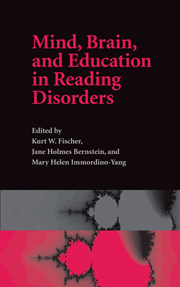Book contents
- Frontmatter
- Contents
- List of figures
- List of tables
- List of contributors
- Acknowledgements
- Part I What is Reading, and What are Reading Disorders? Looking to Neuroscience, Evolution, and Genetics
- Part II Reading and the Growing Brain: Methodology and History
- Part III Watching Children Read
- 10 Finding common ground to promote dialogue and collaboration: using case material to jointly observe children's behavior
- 11 Analyzing the reading abilities of four boys: educational implications
- 12 First impressions: What four readers can teach us
- 13 Analysis of reading disorders from a neuropsychological perspective
- 14 An educational/psychological perspective on the behaviors of three children with reading disabilities
- Part IV Reading Skills in the Long Term
- Appendix: Transcript and behavioral data from Profiles in Reading Skills (Four Boys)
- Index
- References
11 - Analyzing the reading abilities of four boys: educational implications
Published online by Cambridge University Press: 22 September 2009
- Frontmatter
- Contents
- List of figures
- List of tables
- List of contributors
- Acknowledgements
- Part I What is Reading, and What are Reading Disorders? Looking to Neuroscience, Evolution, and Genetics
- Part II Reading and the Growing Brain: Methodology and History
- Part III Watching Children Read
- 10 Finding common ground to promote dialogue and collaboration: using case material to jointly observe children's behavior
- 11 Analyzing the reading abilities of four boys: educational implications
- 12 First impressions: What four readers can teach us
- 13 Analysis of reading disorders from a neuropsychological perspective
- 14 An educational/psychological perspective on the behaviors of three children with reading disabilities
- Part IV Reading Skills in the Long Term
- Appendix: Transcript and behavioral data from Profiles in Reading Skills (Four Boys)
- Index
- References
Summary
Overview: In order for neuropsychological research on dyslexia to be useful to educators and learning-disabled children, its educational implications must be laid out explicitly, and the working definitions and categories framing the neuropsychological research must be tested against the demonstrated needs of dyslexic children. The goal is to assure a good fit between the questions guiding the neuropsychological research and the questions asked by educators about their students. Brady translates the neuropsychological work, such as research on rapid serial naming, into recommendations for educational practice and indicates where neuropsychological research categories seem incongruent with the educational evidence. For example, research indicating that dyslexic children have phonological processing problems often has unclear implications, because several relevant skills, such as phonemic awareness and grapheme decoding, are unjustifiably lumped together. Progress on understanding dyslexia requires better analysis of the relations between written and oral language processing, including component reading skills.
The EditorsAs Jane Holmes Bernstein describes in Chapter 14 (this volume), four boys varying in reading ability were filmed and given a battery of tests to provide a framework for discussion about current views on reading acquisition and reading difficulties. The boys are presented in three contexts. First, each is introduced and portions of his individual conversations with the tester are included, providing a brief window on each boy's language skills and personality. Next, samples of each child's performance on three of the rapid naming tasks are shown: color naming, letter naming, and object naming.
- Type
- Chapter
- Information
- Mind, Brain, and Education in Reading Disorders , pp. 196 - 216Publisher: Cambridge University PressPrint publication year: 2007

